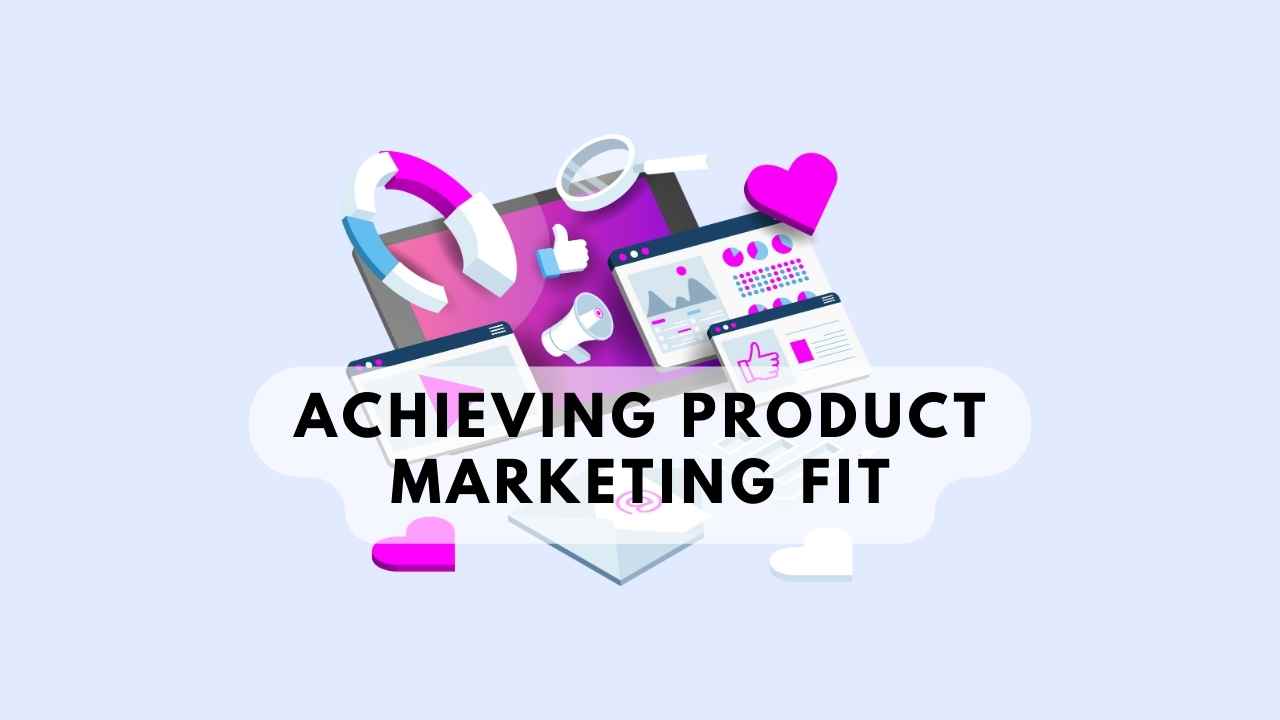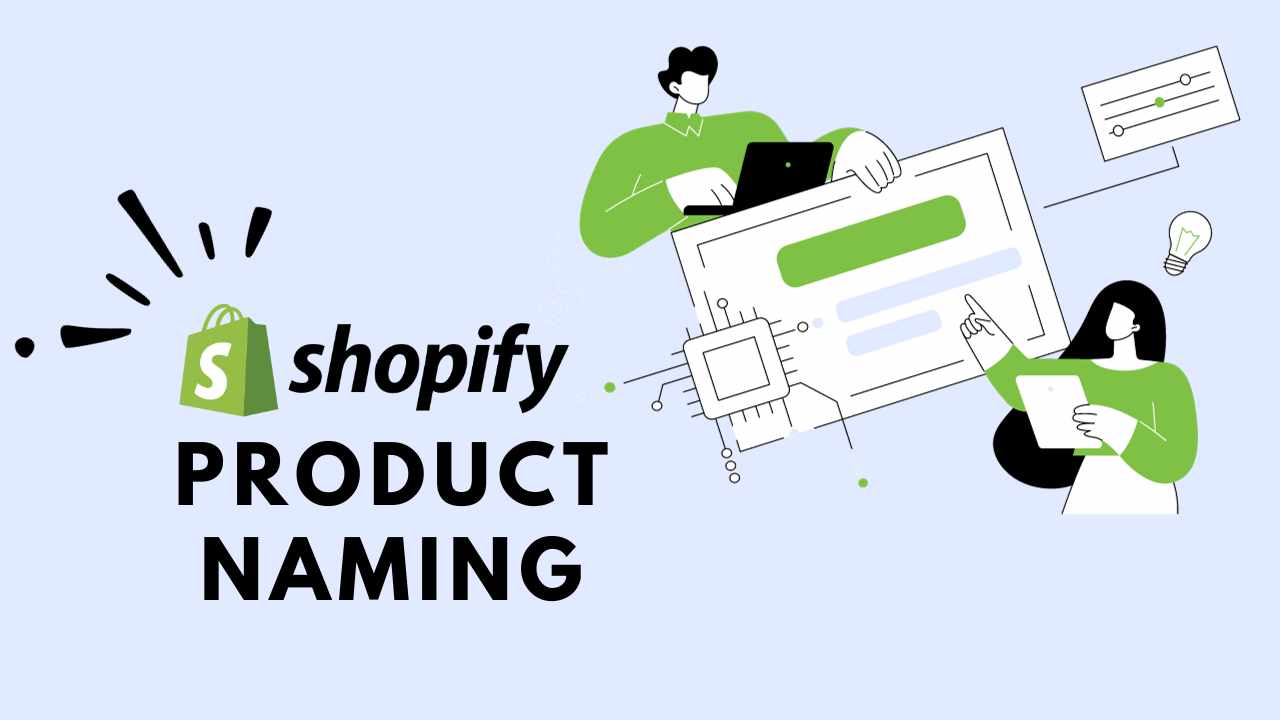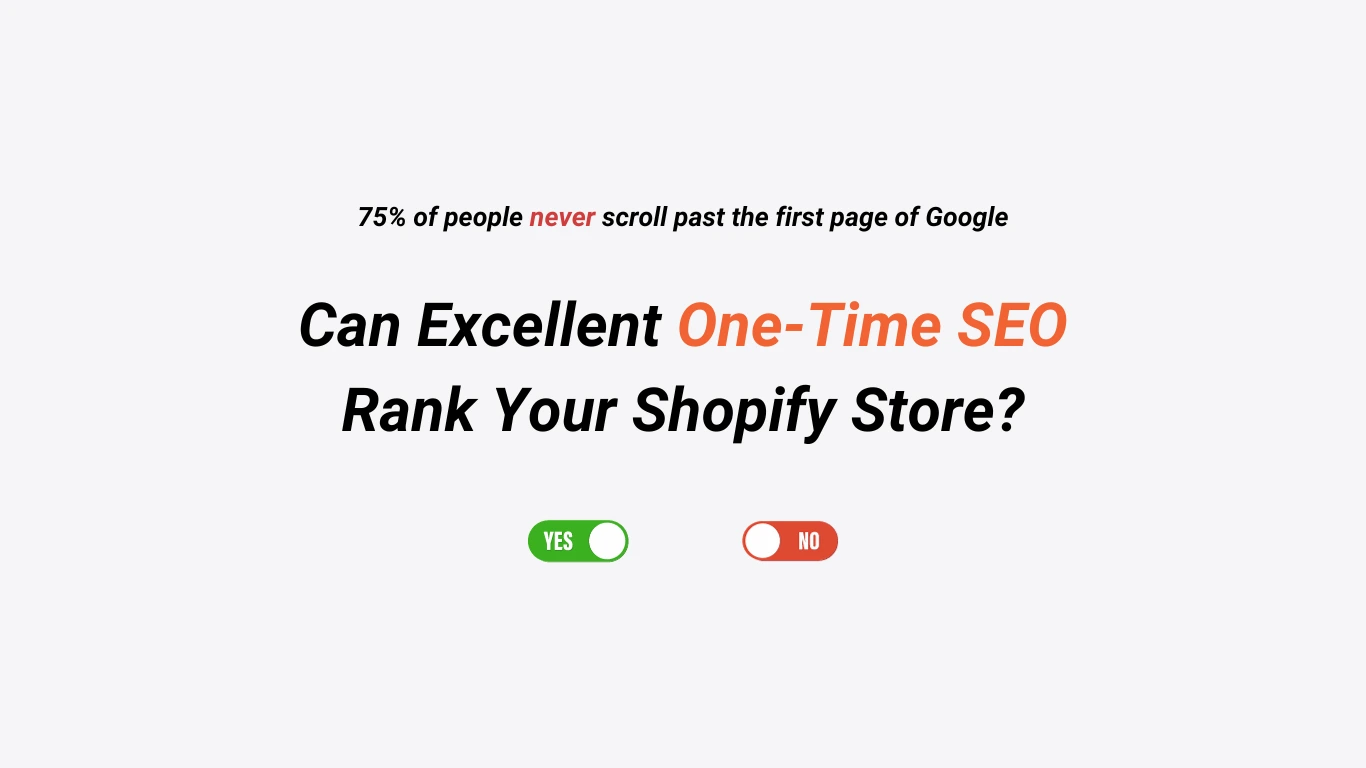Effective Shopify Keyword Research plays a critical role in marketing efforts.
The success rate of any business on Shopify is defined by its keyword targeting strategies. Keywords help businesses to target their ideal customers. However, with millions of Shopify Stores competing for attention, it can take time to stand out from the crowd. Check out our guide to Automate Shopify Keyword Research With ChatGPT.
Solid SEO Keyword Research helps entrepreneurs and merchants drive sales better.
If you are a business operating an online store, this is your definitive guide to conducting Shopify keyword research like a pro!
- The Need for Shopify Keyword Research: A Brief Synopsis
- Shopify Keyword Research 101: Brainstorming
- #1- Conducting Shopify Keyword Research on Google
- #2- Conducting Shopify Keyword Research on Amazon
- #3- Conducting Shopify Keyword Research on Google Keyword Planner
- Don’t Forget The Keyword Refining Process
- Types of Keywords for Shopify SEO
- Have Robust Keyword Selection Criteria
- Become a Shopify Keyword Research Pro: Ranking Indicators
- Our Actionable Shopify SEO Guide Helps Brands Grow
- FAQs
The Need for Shopify Keyword Research: A Brief Synopsis
You already know that finding a relevant keyword is crucial to driving targeted traffic to Shopify websites. As of April 2023, over 4.15 million Shopify Stores are live and operating. In fact, 70% of the store domains in the USA are registered under Shopify, which makes it even more important to brainstorm the right Shopify SEO keywords for your business.
Take a look at this brief synopsis of the countries with the most Shopify Stores worldwide.
| Country | Number of Shopify Stores (Operating) |
| United States of America | 2,653,014 |
| United Kingdom | 178,882 |
| Australia | 128,470 |
An estimated 700 million Buyers rely on Shopify for their purchases.
They type in a search query that leads them to product suggestions. But with so many keywords to choose from, how do you find your target keywords? Keyword Research for Shopify helps you to understand the keywords your customers are typing when looking for your products on Shopify. If you think about it, conducting keyword research for Shopify is simple once you know how to brainstorm these keywords.
Shopify Keyword Research 101: Brainstorming
Great marketing means knowing your audience. The first step in conducting Shopify keyword research is to understand your target audience. The goal is to identify keywords that are relevant to your target audience and your business domain. They must have a high search volume so that your Shopify Store can increase its reach and target different audience groups. Moreover, your Shopify SEO Keywords must have a low competition to help you rank faster and build domain authority.
The best way to understand your target audience for Shopify Keywords is to Build Buyer Personas.
Ask yourself the following questions:
- Who is your ideal buyer?
- What motivates them?
- What are their interests?
- What are their demographics?
- What kind of content are they looking for?
You can start researching the relevant Shopify Keywords using your answers as a base.
As a result, you can better understand the type of content your audience wants to see and the keywords they use to find it. From understanding your target audience to finding the right keywords, Shopify SEO Consultant helps businesses from all walks of the industry.
Our Shopify SEO Experts recommend three ways to initiate Shopify Keyword Research.
Let’s go over them.
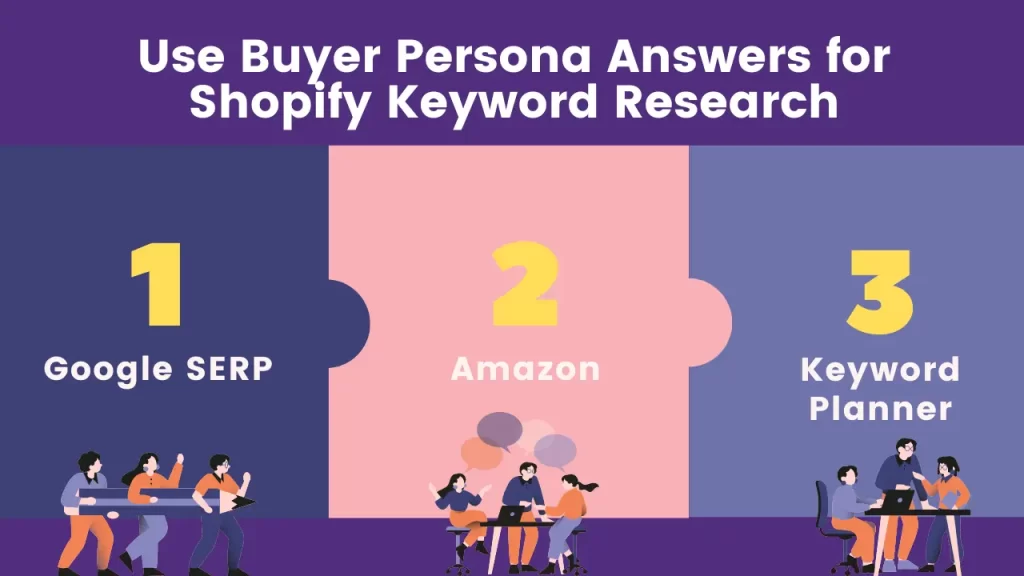
#1- Conducting Shopify Keyword Research on Google
Google handles over 3.5 Billion searches daily, making it the biggest platform for search queries. Shopify Stores can type in their product on the search query page to receive multiple suggestions from the Google Autocomplete Feature. These suggestions are the most popular keywords related to your search query. Besides this, the Google SERP makes Keyword Research for Shopify much easier with the following features.
Raid the Google Organic Results
Start your Shopify Keyword Research by typing in your product or service on Google. The organic results on Google can help you find trending and high-value keywords easily. In addition, you will notice various Shopify meta tags and keywords in the titles of the results. These are the trending Shopify Keywords that you can target.
A Peek into the Google Snippets
Google Snippets is a valuable tool for conducting keyword research for Shopify stores. They are extracted from the top-ranking web pages on Google. You can get keywords, phrases, and terms from snippets that people usually search for. After checking the volume and difficulty of these keywords, you can select the best Shopify Keywords for your Store. Google Snippets are displayed prominently in a featured snippet box.
Dig Deeper with People Also Ask Section
The “people also ask” section on Google contains the most asked questions from users relating to your search topic or product category. Review the questions and look for keywords and phrases that are relevant to your Shopify store. For example, if one of the questions is “What is the best acne treatment for dry skin?” then the keywords “acne treatment” and “dry skin” may be relevant to your Shopify Store.
Check the Related Searches Section
The related searches section on the Google SERP is a great way to find broad Shopify keywords that may be relevant to your store. You can find the “related searches” section at the bottom of the Google search top engine result page or in the middle as “other searches” section. It basically contains the terms related to what you have typed in the search field.
#2- Conducting Shopify Keyword Research on Amazon
Entrepreneurs can conduct keyword research for Shopify on Amazon as well.
This works just like the Google Autocomplete Feature. The only difference is that since Amazon is an e-commerce platform, you can find the best keyword ranking for your Shopify products. All you have to do is type the product or topic related to your Shopify Store, and Amazon will give you suggestions based on the word you type in the search field.
You can try the same with other e-commerce platforms selling similar products to your Shopify Store.
Nonetheless, the research process does not end here.
Shopify Stores gain maximum organic traffic only if they regularly refine their keyword lists further.
#3- Conducting Shopify Keyword Research on Google Keyword Planner
Google Keyword Planner is a great tool for finding relevant keywords for your Shopify Store. After signing into your Google Ads account, you can go to the Keyword Planner tool. In addition, Shopify Store owners can take up the following steps to use Keyword Planner.
- Step 1: Click on “Discover new keywords.”
- Step 2: Enter a few relevant terms related to your Shopify store in the search bar.
- Step 3: Filter your results based on your desired location, language, and other factors.
- Step 4: Analyze the recommended keyword ideas on the basis of search volume, competition, and estimated cost-per-click.
- Step 5: Select the most relevant and high-volume keywords specific to your Shopify store
- Step 6: Add them to your Shopify Store keyword list.
Besides the Google Keyword Planner, you can use any other keyword research tool that works for your needs.
We recommend you look for long-tail keywords, as they are typically less competitive and more specific to your niche.
Some quality tools are Ahrefs, Ubersuggest, and SEMrush.
If you want the best search results ever, Shopify SEO Consultant will help you conduct your research in the most profitable way.
Let’s Roll Out An SEO Strategy For You
Don’t Forget The Keyword Refining Process
Building a versatile Shopify SEO Keywords list will not help you score the #1 Rank in the search engine results.
Instead, refine your list by focusing on the keywords most relevant to your business and with the highest search volume.
Unfortunately, many Shopify Businesses exclude the long tail keywords since they show comparatively less volume.
This is a mistake!
Keep in mind that long-tail keywords are more specific and contain longer phrases. Therefore, they may have a lower search volume, but they are often easier to rank for. The keyword refining process allows you to ensure that your keyword list contains an ideal blend of high-performing, long-tail, and short-tail keywords to drive more targeted traffic.
Shopify Ecommerce Store owners can narrow down and refine the keywords on the basis of:
- Location
- Dates
- Trends
- Topics
- Related Topics
Analyze Competitor Keywords
Once you have a list of potential keywords, it’s time to see what your competitors are doing. First, look at the top-ranking stores in your niche and see what keywords they are targeting. After analyzing their keywords, you should better understand which keywords are most important to your niche.
Analyze User Intent Keywords
User intent refers to the reason why someone is searching for a particular keyword. For example, someone searching for “buy red party shoes” is likely ready to make a purchase. On the other hand, someone searching for “best party shoes” may be more interested in reviews or comparisons only. By understanding user intent, you can create content that matches the searcher’s needs and drives more conversions.
Find Shopify Keywords That Sell
Monitoring your competitors and the market trends helps you understand the keyword that sell. Thus, update your target keyword lists with keywords that help you sell online. Besides improving your technical SEO, having marketable Shopify keywords can also help you to create compelling product listings and ad campaigns. Using language that resonates with your target audience and highlights the benefits of your products, you can create clear copy that encourages customers to purchase.
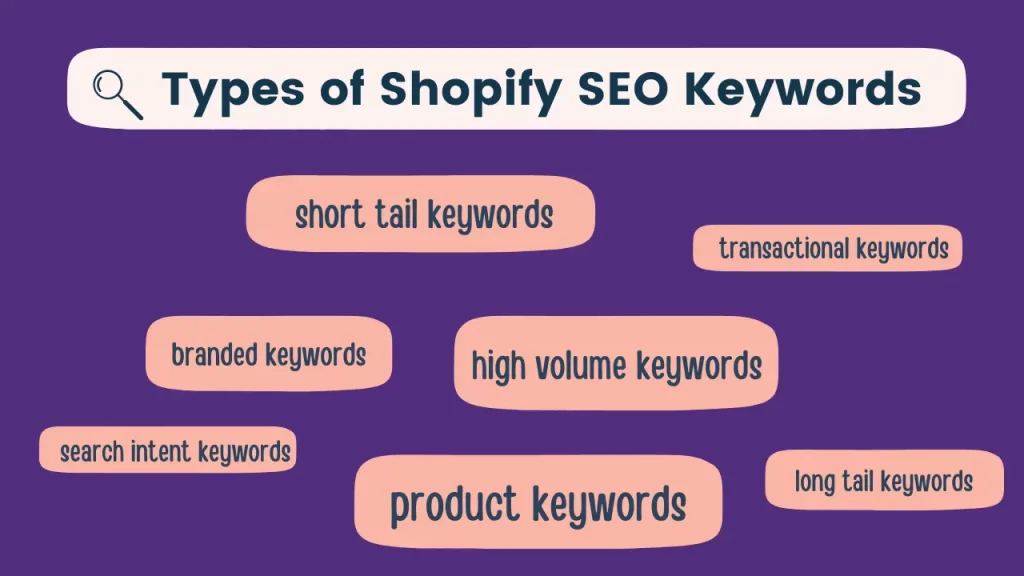
Types of Keywords for Shopify SEO
When conducting Shopify keyword research, you need a versatile bunch of keywords to market your products well. This is where the different types of keywords come into play. Doing this helps build a structured, user-friendly funnel that optimizes site navigation. In addition, you can establish a hierarchy of related topics and subtopics with keywords to guide your content creation. This is called the Keyword Mapping Process.
Our guide Shopify Sitemap 101: How to Create a Robust Shopify Sitemap discusses all about Keyword Mapping.
We’ve elaborated the process of mapping various types of keywords for Shopify SEO Rankings.
Before building keyword clusters, you need to understand the various types of keywords.
Short-tail keywords
As the name suggests, short-tail keywords are short. They are usually only one or two words long, which makes them broad keywords. Unfortunately, short-tail keywords are targeted bajillion times by bazillion brands, so they are difficult to rank for. In addition, short-tail keywords are not the best for brands that have just started out. For example, “shoes.”
Long-tail keywords
Long-tail keywords are longer, which makes them more specific. They are usually three or more words long. Using long-tail keywords on your Shopify Store helps the search engine understand exactly what your store offers. Thus, such keywords will help in placing your store better online. Moreover, these keywords are great for page titles and high-quality backlinks as well. An example of a long-tail keyword would be “black stiletto shoes for women.”
Branded keywords
Everyone can not target branded keywords since they include a brand name. Many blogs or websites use branded keywords when putting out content regarding the brand; bidding your money to rank for these branded keywords is a waste of time. For example, “Vessi Shoes.”
Product keywords
The product keywords can be utilized to market products and services. They are highly semantic to Shopify Products and often drive more traffic for Shopify Businesses. These keywords usually describe a specific product or category of products. For example, “running shoes.” Therefore, they are recommended to add such keywords in the product descriptions, meta descriptions, and image alt tags.
Check out our guide How to Write Shopify Product Descriptions That Convert.
Have Robust Keyword Selection Criteria
Shopify is by far the most popular e-commerce store in the USA. With the right keyword research for Shopify, you can increase traffic to your Shopify site, improve search engine rankings, and ultimately boost your sales. The keywords you choose for your SEO campaign will significantly impact several parts of your SEO strategy. These specific words influence the website’s structure, on-page SEO, content and link-building techniques, and other factors.
Consequently, since comprehensive keyword research forms the basis of your SEO strategy, it must be focused upon.
Keep in mind the following criteria when selecting SEO keywords for your Shopify Store:
- Relevance- Choose keywords that are relevant to your Shopify business domain, services, and products.
- Search Volume- Select keywords with high search volumes to maximize your reach and traffic potential.
- Competition- Look for keywords with low competition to increase your chances of ranking at the top.
- Search Intent- Consider the intent behind the keyword and whether it aligns with your business goals.
Become a Shopify Keyword Research Pro: Ranking Indicators
Now if you have conducted your keyword research and placed them on your Shopify website, you will patiently wait to see the results, right? That’s the best part for us too! With the following ranking indicators, you can measure the performance of your Shopify SEO Keywords.
- Better Rankings-
Good search engine rankings of Shopify Sites on Google and other search engines are a clear indicator of structured data on your store. When you create informational pages with high search intent and the best SEO keywords, your domain authority automatically goes up.
- Click Through Rate-
Getting good CTR for high-quality keywords means users are clicking on your content. This gives you an opportunity to maintain a topical authority for certain high-performing keywords. You can embed better keywords in your meta description, product category page, and even title tags. While your competitors strive to rank for those keywords, you make your buck.
- Goal Completion-
Did you just score a massive revenue out of a specific page? That must be the magic of a special keyword. Oftentimes, the long-tail targeted keywords help your Shopify product pages to rank in front of a purchase-ready audience, which results in great profits. It is a clear indicator that your Shopify Keywords were phenomenal!
Focusing on product-centric keywords with obvious purchase intent is essential. It’s must to conduct efficient keyword research for an e-commerce business. It helps to optimize your online store for search engines and outrank competitors.
Our Actionable Shopify SEO Guide Helps Brands Grow
We focus on results! Shopify’s search engine optimization specialists can help customers identify lost sales opportunities and capitalize on them to increase sales. Shopify SEO Services include Keyword Research, Technical SEO Issues, Shopify Audits, On-Page SEO, Link Building, and more. We’re a Niche-Specific Shopify SEO Agency for all your business needs.
With this actionable guide, you can identify the most relevant and profitable keywords for your Shopify SEO Strategy.
Use these keywords to:
- optimize your content
- attract more customers
- boost conversion rate
Remember to focus on user intent and create high-quality, engaging content. This will help you to continually track your rankings. Lastly, adjust your Shopify keyword strategy as and when needed, that’s how the pros do it!
After your comprehensive keyword research, Create a Robust Shopify Sitemap.
We highly-recommend you to check out the our next guide:
FAQs
How often should I update my Shopify keyword research list?
It is best to update your keyword research every few months to stay up to date with changes in search volume and user intent. For example, a Shopify website regularly updating its keywords on relevant product pages scores quality traffic.
How much traffic can one keyword generate for my Shopify Store?
It depends on the keyword and how much traffic it can get you. Keyword selection criteria like volume, competition, relevance, and CPC determines the searches your Shopify Store will receive from a keyword.
What is the best way to kickstart my keyword research for Shopify?
It is recommended to brainstorm a list of potential keywords that people might use to describe your Shopify products. Tools like Keyword Planner and Google Trends can help you find these terms. It is best to get in touch with Shopify SEO Services to build indexable pages and a powerful keyword list.
Is Shopify good for SEO and keyword research?
Shopify provides smart SEO tools that an online retailer or entrepreneur needs. Even though there are many Shopify Apps offering search engine optimization options, but they can be overwhelming. Shopify SEO Consultant makes it easy for businesses to find Shopify Keywords and reach maximum targets in a short time frame.



